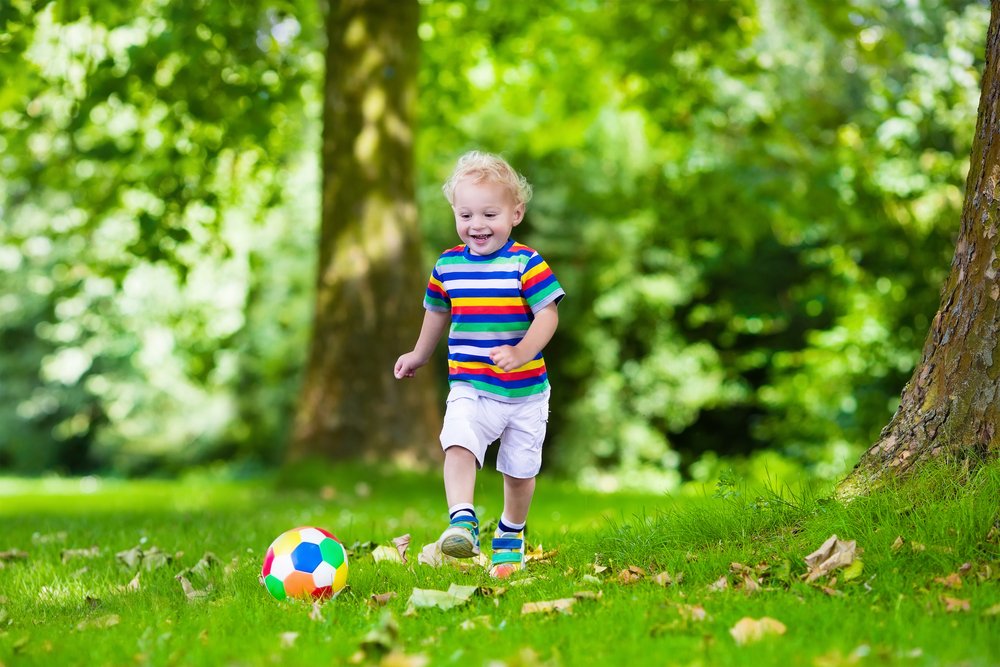Key points:
1. Your child’s physical skills, muscle control, balance, and coordination are developing.
2. Progressing from one skill to the next is a sign of their developmental process.
3. Encourage physical activity and motor skill development.
4. Focus on the major skill of kicking, which develops gradually.
Your little one is learning important physical skills as they gain muscle control, balance, and coordination. They will always try to do more and more and, once you see they start walking, physical activity and improvement of motor skills will keep increasing. Each new skill lets them progress to the next one, building on a foundation that leads to more complicated physical tasks. This is a result of their muscle strength and a sign of their developmental process.
You can take advantage of your little one’s natural desire to keep moving and help them establish activity patterns that will contribute to their development, while also laying a foundation for them to remain active later on.
Today we will focus on one major skill related to playing with balls: kicking.
What you might see
Your little one has probably just started to walk, and you can swear you’ve just seen them kick a rubber ball. This is very likely. Around their second birthday, they will have enough hand-eye coordination to be able to do this.
Kicking progresses gradually. Around 14 months of age, they will able to hold a ball in their hands and they’ll be able to kick it probably around a month later. Later on, they will be capable of swinging their leg to kick it, while their coordination skills keep improving. At around 18 months, they might be able to run towards a ball and kick it, and, at 26 months, they will be able to kick a moving ball. One day you’ll see them accomplish this and aim it with a lot more force, direction, and arm and legs coordination.
What do they need to develop this skill?
Kicking implicates much more than just strength in their tiny limbs, they need to improve more things. Let us show you the wonders of kicking!
- Before they are able to kick a ball, your child must’ve developed basic cause and effect thinking. Kicking for the first time is like doing an experiment; they will need to observe what’s happening and what’s making the ball move.
- They will also need to have mastered balance to a degree in which they can stand on one foot for at least a few seconds
- They will need to develop enough coordination and spatial awareness to calculate where the ball is located and when they need to move their leg to kick it. The first few times they might miss it, but little by little they will get there, until one day they will aim perfectly.
It is recommended for your little one not to be inactive for more than an hour, except when sleeping. Now that they are starting to develop ball skills, many more activities will be available for you two to take on together!
How can you help?
- To motivate them, put them in contact with balls. Have some around their play area or even try to roll a ball towards them.
- Choose a lightweight ball, so they are able to push it back with their foot. You can even take some of the air out, so it is easier for them to kick it.
- Have a game in which they can practice standing on one foot. It will contribute to working on their balance and strengthening their muscles.
- You can have some barefoot activities, so they develop feet sensitivity.
- You can also play games that contribute to their coordination. Have them repeat your clapping patterns or walk in a straight line. This can contribute to spatial awareness as well, building up the necessary skills for kicking.
- Demonstrate kicking yourself or show them how someone else kicks a ball, so they can imitate the movement.
- When they’re finally able to do it, cheer!
Acquisition of ball skills can be so fun! Your child will move on to catching and throwing as well. This will be a great opportunity to keep them busy with physical activities while having fun. Later on, they’ll learn about teamwork and discipline! Take the time to play with them.








